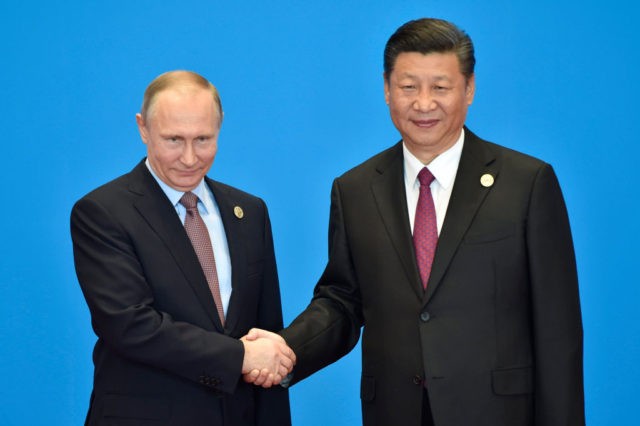Russia and China issued a joint statement Tuesday calling for a summit of the permanent members of the U.N. Security Council. The statement implied – and the foreign ministers of the two authoritarian regimes clearly stated afterward – the meeting would be a forum for Russia and China to air their grievances against U.S foreign policy.
“At a time of increasing global political turbulence, a summit of the permanent members of the U.N. Security Council is particularly necessary to establish direct dialogue about ways to resolve humankind’s common problems in the interests of maintaining global stability,” the joint statement from the Russian and Chinese foreign ministries asserted.
Russian Foreign Minister Sergei Lavrov said in a press conference Tuesday that Moscow and Beijing want the U.N. Security Council to rein in the United States, as quoted by Reuters:
We noted the destructive nature of U.S. intentions, relying on the military-political alliances of the Cold War era and creating new closed alliances in the same spirit, to undermine the U.N.-centered international legal architecture.
We emphasized that against the background of active attempts by the West to promote its concept of a ‘rules-based world order’, the joint efforts of Russia and China … to preserve the modern system of international law are becoming more and more relevant.
Chinese Foreign Minister Wang Yi presented his own government as the guardian of global stability and social justice:
We should act as guarantors of justice in international affairs. China is ready to promote the international system established by the United Nations, protect the world order based on international law, and abide by universal values such as peace, development, justice, democracy, equality and freedom.
Lavrov and Wang said their goals include reducing the importance of the U.S. dollar to the world economy and undermining sanctions as an instrument of U.S. foreign policy. Lavrov added criticism of the European Union for its own human rights sanctions against the brutal regimes in Beijing and Moscow. Russia and China both regard such sanctions as unacceptable infringements on their sovereignty.
“Interference in a sovereign nation’s internal affairs under the excuse of ‘advancing democracy’ is unacceptable,” the joint statement from Russia and China argued.
“Countries should stand together to oppose all forms of unilateral sanctions,” Wang urged at the press conference Tuesday.
These comments were clearly a response to new rounds of sanctions against Russia and China announced over the past week, but the importance of China’s successful ambush of the Biden administration in Alaska should not be underestimated. Moscow and Beijing appear to sense weakness and would seek an opportunity to repeat the stunt China pulled off last week at a meeting of the Security Council.
If the topic of the summit is America’s alleged lack of moral standing to impose human rights sanctions against other nations, the Chinese delegation to the Security Council could repeat most of the tirade Politburo member Yang Jiechi launched against U.S. Secretary of State Antony Blinken word-for-word. Beijing has made clear in its official statements and government-run media it regards the meeting in Alaska as a triumphant performance.
Another Russian-Chinese objective at the Security Council would be shoring up a coalition they have been putting together with other tyrannies like North Korea and Iran. China stepped up its diplomatic outreach to rogue states after the Alaska meeting.
Even if Moscow and Beijing “lose” at the Security Council by failing to persuade other members that human rights sanctions are unjust and the U.S. is the great threat to global order, they can still use the encounter to advertise their growing axis as a viable diplomatic and economic alternative to the judgmental West – offering a club as prestigious as the United Nations that can be joined by authoritarian regimes without making any concessions to human rights or democracy.

COMMENTS
Please let us know if you're having issues with commenting.